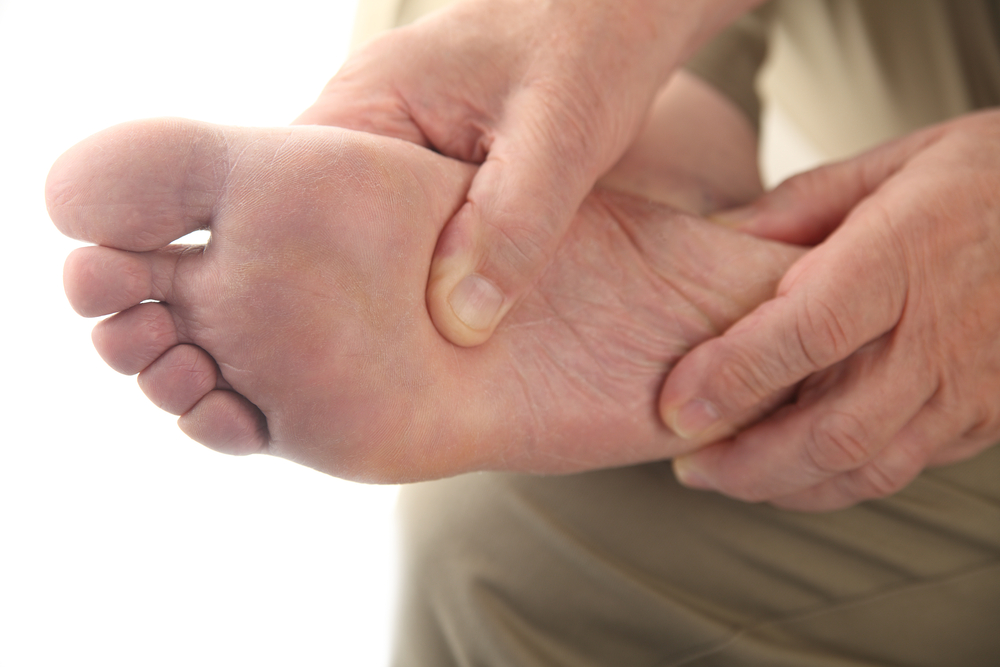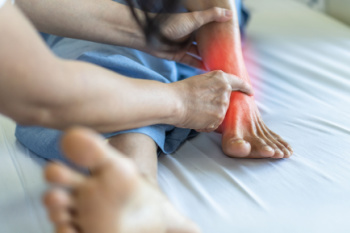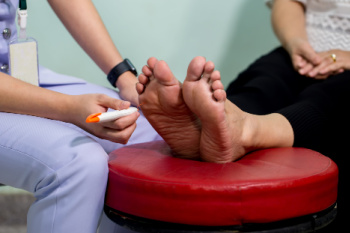

Diabetes elevates the risk of foot complications due to nerve and blood vessel damage, underscoring the importance of regular foot exams conducted by a podiatrist. These assessments are crucial for early detection and prevention of issues that could lead to serious infections or amputations. Even minor wounds like blisters or cuts can escalate into ulcers and infections if not promptly addressed. Moreover, diabetes related vascular damage impairs blood flow to the feet, hindering the healing process and increasing the risk of tissue death, or gangrene. A comprehensive foot exam evaluates nerve function, circulation, skin condition, and musculoskeletal structure. Tests such as the monofilament and tuning fork assessments, along with vascular checks, help identify abnormalities indicative of neuropathy or reduced sensation. In addition to a yearly foot exam by a podiatrist, more frequent assessments are suggested for those with a history of foot complications. Consistent foot care and blood sugar management are also necessary for preventing diabetic foot problems. If you have diabetes and encounter foot problems, it is suggested that you schedule an appointment with a podiatrist for a complete foot exam.
Diabetic foot care is important in preventing foot ailments such as ulcers. If you are suffering from diabetes or have any other concerns about your feet, contact Dale Delaney, DPM from InStride Kinston Podiatry Center. Our doctor can provide the care you need to keep you pain-free and on your feet.
Diabetic Foot Care
Diabetes affects millions of people every year. The condition can damage blood vessels in many parts of the body, especially the feet. Because of this, taking care of your feet is essential if you have diabetes, and having a podiatrist help monitor your foot health is highly recommended.
The Importance of Caring for Your Feet
Patients with diabetes should have their doctor monitor their blood levels, as blood sugar levels play such a huge role in diabetic care. Monitoring these levels on a regular basis is highly advised.
It is always best to inform your healthcare professional of any concerns you may have regarding your feet, especially for diabetic patients. Early treatment and routine foot examinations are keys to maintaining proper health, especially because severe complications can arise if proper treatment is not applied.
If you have any questions please feel free to contact our office located in Kinston, NC . We offer the newest diagnostic and treatment technologies for all your foot and ankle needs.
 Tarsal tunnel syndrome is a condition that occurs when the tibial nerve, which runs through the inside of the ankle, becomes compressed. This compression can lead to a range of symptoms, commonly including a tingling sensation, numbness, or a burning pain in the foot, especially in the sole or arch. Some people may also experience these sensations extending to the heel, toes, or up into the calf. The discomfort often worsens with activity and can become more pronounced at night. Tarsal tunnel syndrome can be caused by anything that increases pressure in the tarsal tunnel, such as swelling from an injury, flat feet that strain the nerve, or growths like cysts. If you suspect tarsal tunnel syndrome, it is suggested that you seek prompt evaluation from a podiatrist.
Tarsal tunnel syndrome is a condition that occurs when the tibial nerve, which runs through the inside of the ankle, becomes compressed. This compression can lead to a range of symptoms, commonly including a tingling sensation, numbness, or a burning pain in the foot, especially in the sole or arch. Some people may also experience these sensations extending to the heel, toes, or up into the calf. The discomfort often worsens with activity and can become more pronounced at night. Tarsal tunnel syndrome can be caused by anything that increases pressure in the tarsal tunnel, such as swelling from an injury, flat feet that strain the nerve, or growths like cysts. If you suspect tarsal tunnel syndrome, it is suggested that you seek prompt evaluation from a podiatrist.
Tarsal tunnel syndrome can be very uncomfortable to live with. If you are experiencing tarsal tunnel syndrome, contact Dale Delaney, DPM of InStride Kinston Podiatry Center. Our doctor can provide the care you need to keep you pain-free and on your feet.
Tarsal Tunnel Syndrome
Tarsal tunnel syndrome, which can also be called tibial nerve dysfunction, is an uncommon condition of misfiring peripheral nerves in the foot. The tibial nerve is the peripheral nerve in the leg responsible for sensation and movement of the foot and calf muscles. In tarsal tunnel syndrome, the tibial nerve is damaged, causing problems with movement and feeling in the foot of the affected leg.
Common Cause of Tarsal Tunnel Syndrome
The Effects of Tarsal Tunnel Syndrome
A physical exam of the leg can help identify the presence of tarsal tunnel syndrome. Medical tests, such as a nerve biopsy, are also used to diagnose the condition. Patients may receive physical therapy and prescriptive medication. In extreme cases, some may require surgery.
If you have any questions please feel free to contact our office located in Kinston, NC . We offer the newest diagnostic and treatment technologies for all your foot and ankle needs.

First and foremost, wearing ill-fitting shoes can lead to a myriad of injuries. Whether they are too tight, too loose, or simply not designed for the activity you are engaging in, improper footwear can place undue stress on your feet, ankles, lower legs, and joints, increasing your risk of pain and injury. From common issues like shin splints and ingrown nails to more severe problems such as bunions and postural misalignments, the repercussions of wearing the wrong shoes can be far-reaching and debilitating, potentially limiting your ability to engage in physical activity altogether. Furthermore, wearing the wrong shoes can worsen existing conditions, such as arthritis, making daily activities more challenging and uncomfortable. Plus, when your shoes fail to support your natural gait or foot structure, it can lead to overpronation, underpronation, or other biomechanical issues, placing added strain on your joints and increasing your risk of injury. If your feet are painful after performing certain activities or from wearing certain shoes, it is suggested that you schedule an appointment with a podiatrist to determine whether your footwear may need to be changed.
Finding a properly-fitting shoe is important in reducing injuries and preventing foot problems. For more information about treatment, contact Dale Delaney, DPM from InStride Kinston Podiatry Center. Our doctor will treat your foot and ankle needs.
Proper Shoe Fitting
A common concern when it comes to foot health, having properly fitted shoes can help prevent injuries to the foot. Out feet affect our posture and gait, which in turn affects the biomechanics and overall bodily structure. With 33 joints, 26 bones, and over 100 ligaments, the potential for serious injury is much greater than one realizes. Although the feet cease growth in adulthood, they still change shape as they mature. Here are some factors to consider when it comes to investing in proper fitting shoes:
Keeping in mind how shoes fit the biomechanics of your body, properly-fitting shoes are vitally important. Fortunately, it is not difficult to acquire footwear that fits correctly. Be sure to wear shoes that support the overall structure of your body. Do your feet a favor and invest in several pairs of well-fitted shoes today.
If you have any questions please feel free to contact our office located in Kinston, NC . We offer the newest diagnostic and treatment technologies for all your foot and ankle needs.

Peripheral neuropathy causes a variety of symptoms affecting the feet. It typically begins with sensations such as numbness, tingling, or prickling, and progresses to burning, freezing, or shooting pains, often intensified at night. Peripheral neuropathy in the feet may create a sensation similar to wearing an invisible sock. Loss of balance, muscle weakness, and coordination difficulties are also common factors, hindering mobility. Symptoms of peripheral neuropathy can vary, with motor nerve damage resulting in muscle weakness. Sensory nerve damage causes tingling, numbness, or extreme sensitivity to touch. Autonomic nerve involvement can lead to abnormalities in foot temperature, sweating, and other involuntary functions. Polyneuropathy, affecting multiple nerves simultaneously, is common and requires prompt recognition for timely intervention. If you suspect you may be experiencing symptoms of peripheral neuropathy, it is suggested that you schedule an appointment with a podiatrist for an evaluation and personalized treatment.
Neuropathy
Neuropathy can be a potentially serious condition, especially if it is left undiagnosed. If you have any concerns that you may be experiencing nerve loss in your feet, consult with Dale Delaney, DPM from InStride Kinston Podiatry Center. Our doctor will assess your condition and provide you with quality foot and ankle treatment for neuropathy.
What Is Neuropathy?
Neuropathy is a condition that leads to damage to the nerves in the body. Peripheral neuropathy, or neuropathy that affects your peripheral nervous system, usually occurs in the feet. Neuropathy can be triggered by a number of different causes. Such causes include diabetes, infections, cancers, disorders, and toxic substances.
Symptoms of Neuropathy Include:
Those with diabetes are at serious risk due to being unable to feel an ulcer on their feet. Diabetics usually also suffer from poor blood circulation. This can lead to the wound not healing, infections occurring, and the limb may have to be amputated.
Treatment
To treat neuropathy in the foot, podiatrists will first diagnose the cause of the neuropathy. Figuring out the underlying cause of the neuropathy will allow the podiatrist to prescribe the best treatment, whether it be caused by diabetes, toxic substance exposure, infection, etc. If the nerve has not died, then it’s possible that sensation may be able to return to the foot.
Pain medication may be issued for pain. Electrical nerve stimulation can be used to stimulate nerves. If the neuropathy is caused from pressure on the nerves, then surgery may be necessary.
If you have any questions, please feel free to contact our office located in Kinston, NC . We offer the newest diagnostic and treatment technologies for all your foot care needs.